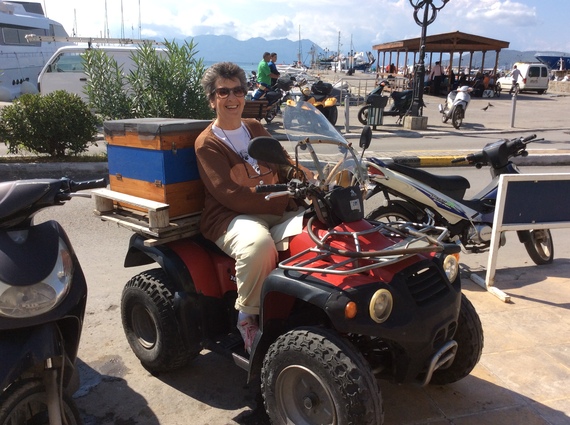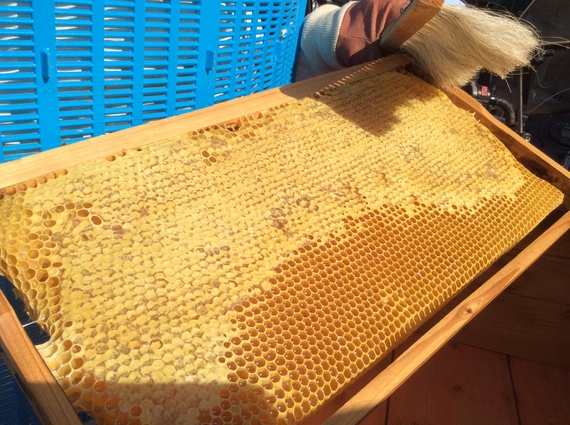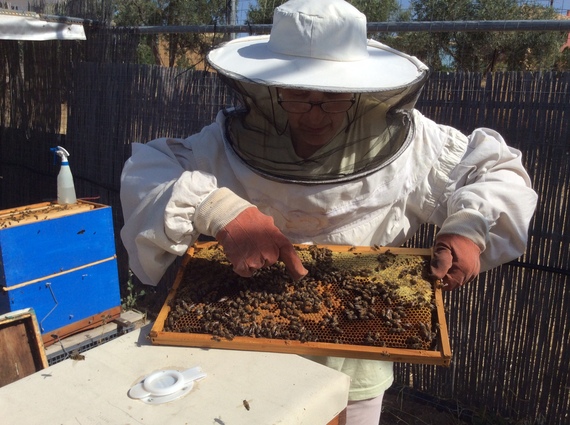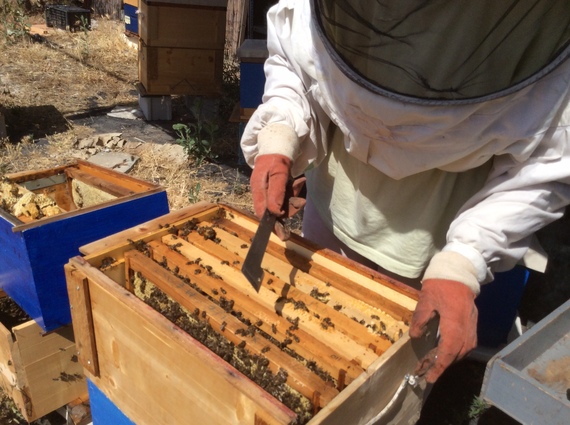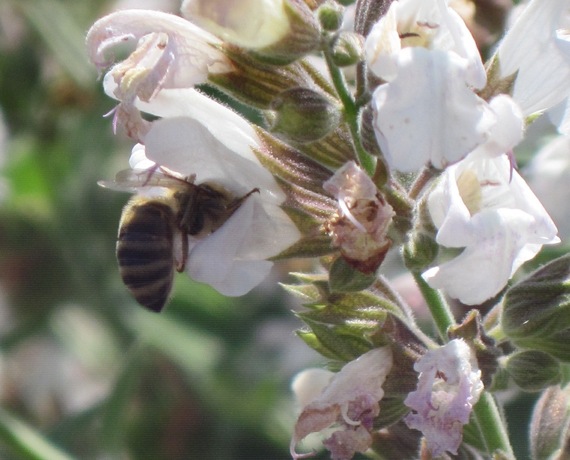In the midst of the Greek crisis, life can still be sweet.
In Greece motorbikes are everywhere. While bareheaded locals and helmeted tourists careen along coastal roads, there is one four wheeler here on Aegina Island that is unique and familiar; it has a beehive strapped on the back. It belongs to Nina Stergiopoulou, keeper of bees.
The Greek crisis can be blamed for a lot, but for many resilient Greeks, it can be thanked for forcing a redirection that ignites a passion and simply makes the world a better place. Such is Nina's story. Turning life's page from national and personal adversity, Nina moved to Aegina, searching for ways to use her family property at the tip of the island when someone proposed she consider beekeeping. Not certain, she "googled it" and so began Nina's journey into the magical and still largely mysterious life of the honeybee.
What was once a garden-center is now her beloved apiary, "Bees & Aegina." Clustered along the paths that once held plants and flowers before the crisis took its toll on local business, are thirty-seven hives. Nina has not just found a business that holds her devotion; she has found a happiness that can only be described as sublime when you see the look on her face as she describes the wonder of honeybees.
You cannot control a bee colony but only respect it and work with it.
In the beginning, Nina read books and joined a beekeeping blog and found the conversation fascinating and refreshing beyond the constant of politics and austerity. She was hooked and bought three hives. These first colonies were the perfect workshop while she applied her beekeeping lessons.
I am beneath them. We are all beneath them in our culture.
Nina explained that each hive is a community unto itself with its own scent and gathers its needs from either flowers or herbs. Here's where it gets interesting. Foraging bees go out in search of a good source and return to 'dance' to the rest of the gatherers. 'Whaaaat?' said I. It's true. A scout bee returns with the information of the direction and the distance to the food source. She (they are all females) wiggles back and forth and depending on the duration of the dance and the range of its swing conveys the geometric relationship between hive, sun and source. The collector bees then know exactly where to go and also the quality and quantity of the food.
At the apiary Nina, with measured calm, goes about gathering honey. She cannot hear our questions over the hum that fills her netted space, but points out the dark sticky propolis that seals the hive and the perfectly built comb full of honey.
Winter or summer the hive's interior temperature stays at 33-36 degrees Celsius; heating and cooling controlled by the beating of the bees' wings. Workers are also responsible for cleaning the hive and the cells, nursing the queen and larvae. Worker bees are the builders, storekeepers, security and collectors. Considering that a worker-bee's life is 35 days, this kind of wisdom and cooperation is astonishing.
Nina removes another frame and points out the long bodied queen. The queen, she explains, is more like the mother than the ruler. Her role is to continually replenish the hive with eggs. She's completely dependent and fed solely on royal jelly, which workers excrete from a gland in their chest.
The queen will live three to six years and when she becomes weak, the workers begin to make a cluster of longer wax cells into which a normal egg is laid. However, these cells will get a dollop of royal jelly before they are sealed closed. In sixteen days new queens will mature and the first one to emerge kills the others by stinging through the wall of the rival cells.
The young queen then flies from the hive for the first and last time. She is on assignation with the drones from surrounding hives that have gathered at a place only the queens and drones know. Here in the air, several matings seal the fate of the drones that die after implanting their reproductive organs into the queen. Their lifespan is just three months. The queen returns to the hive to begin her life work producing eggs, keeping the colony alive. Without a queen the colony dies. A normal colony has one queen, a few hundred drones and about thirty-fifty thousand workers.
There is democratic efficiency in place that the beekeeper merely assists in supporting. Bees ceaselessly create six "super" products, which people use for beauty, health, therapeutic treatment, anti-aging and cosmetics: honey, pollen, propolis, royal jelly, wax and venom. It is a startling realization that the healthful products bees produce are not actually produced for human consumption. That is not the job of the bees. These precious commodities are essentially what we plunder from their main purpose on this planet. And that is to pollinate the trees and flowers. Essentially keeping the world alive and thriving.
Working with the bees I feel my existence as part of a magnificent universe.
Witnessing this robust yet intricate system brings light to the plight of the bees and ourselves unless we adjust our human-centric perspective to one of stewardship. The world does not revolve around the human being. Nature is self-sustaining and proves this efficiency in the harmony, balance and bounty of the hive. We must respectfully interact with nature's systems to benefit from these and other gifts of nature. That is our privilege.
It's a privilege that Nina embraces with unbridled joy. She produces organic honey, propolis tincture, royal jelly, honeycomb and pollen. The evolution of Nina's passion is a line of skin care products which purity and natural benefits cannot be disputed. Using beeswax, propolis, olive oil from her own trees and flower essences from her garden, Nina has created products that are not only beneficial and therapeutic but intoxicatingly scented, healing the psyche as well.
Out of adversity and in the midst of austerity, Nina has discovered that Nature provides abundantly regardless of economics or politics and that if you follow your joy, life can indeed be sweet.
Photo Credits: Theresa James and Nina Stergiopoulou

